World Humanitarian Day 19 August 2020
August 19, 2020Honouring #RealLifeHeroes.
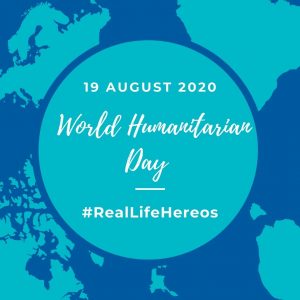 It feels natural for us to reach out to others when they are in need. We are, overwhelmingly, unable to stand back and not help those who are vulnerable, neglected or suffering. At times it can feel all too much and we feel powerless, especially in turbulent times like those we are all experiencing now, but rather than turning away from what can seem to be so insurmountable – I am heartened by the many taking action, in small, and not so small ways. Mary MacKillop famously said “Never see a need without doing something about it” and as we approach World Humanitarian Day on 19 August – we honour those who live by this example every day.
It feels natural for us to reach out to others when they are in need. We are, overwhelmingly, unable to stand back and not help those who are vulnerable, neglected or suffering. At times it can feel all too much and we feel powerless, especially in turbulent times like those we are all experiencing now, but rather than turning away from what can seem to be so insurmountable – I am heartened by the many taking action, in small, and not so small ways. Mary MacKillop famously said “Never see a need without doing something about it” and as we approach World Humanitarian Day on 19 August – we honour those who live by this example every day.
The United Nations established World Humanitarian Day in 2009 and the annual celebration honours those who have lost their lives in the service of others and recognises the amazing efforts by medical and aid workers in alleviating the suffering and hardships of so many around the world. They show the resilience, kindness and compassion of our shared humanity, by dedicating their time, energy and their lives to make the world a better place through their selfless acts. Humanitarian workers don’t hesitate to go where many may fear to venture and offer up their service to the needs of humanity; helping women, children, men and whole families survive in conflict and disaster zones. It takes such courage, of both heart and soul, to follow the calling to live one’s life for others. I can only imagine the struggle not to become weary with so many to help with so little resources, and yet they preserve and echo Mary’s words in their heart, taking… “fresh courage’, determined to do all that they can. We are so thankful for their service every day, especially right now during COVID-19 and the impact this has on being able to do their incredibly hard work.
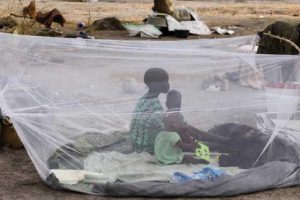 You and I, might not be able to enter into a war zone or be able to jump on a plane to offer medical care during a worldwide pandemic, but we can see the needs of others around us in our daily lives and find a way to take action. There are so many ways we can show our humanity and honour those who do what we cannot; by volunteering, helping a neighbour, paying it forward, offering a hand up and committing to the simple idea of a weekly act of kindness. Anyone can be a humanitarian – it truly doesn’t take much to make a difference and make the world a better place.
You and I, might not be able to enter into a war zone or be able to jump on a plane to offer medical care during a worldwide pandemic, but we can see the needs of others around us in our daily lives and find a way to take action. There are so many ways we can show our humanity and honour those who do what we cannot; by volunteering, helping a neighbour, paying it forward, offering a hand up and committing to the simple idea of a weekly act of kindness. Anyone can be a humanitarian – it truly doesn’t take much to make a difference and make the world a better place.
May we all heed the example set by Mary MacKillop, by the Sister of Saint Joseph and by the #RealLifeHeroes, the Humanitarian workers, and do what we can to serve those in need.
If you’d like more information on how you can take action and transform the lives of vulnerable and neglected people here in Australia and overseas, visit Mary MacKillop Today to learn more.
Kelly Vance, Direct Marketing Officer
Mary MacKillop Today
Climate Emergency in the Pacific Webinar
August 17, 2020Webinar on the Climate Emergency in the Pacific and how Australians should Respond
On the 5th anniversary of Pope Francis’ Laudato Si’ encyclical, you are invited to a special Zoom webinar on the climate emergency in the Pacific and how Australians should respond.
Join Bishop Vincent Long (Bishop of Diocese of Parramatta) and His Excellency Anote Tong (former President of Kiribati) for a conversation facilitated by Jan Barnett rsj.
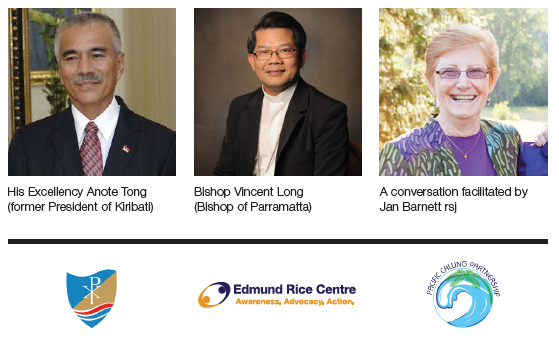
For more information and to RSVP, please click on the link and view the flyer provided below:
Webinar on the Climate Emergency in the Pacific
Laudato Si’ Webinar: Part Five
August 13, 2020In May 2015 Pope Francis launched his encyclical with the subtitle “On Care for our Common Home” and the title “Laudato Si’” which are the opening words for a hymn composed by St Francis of Assisi in the 1200s.
For our time, this document is both relevant and important, since it highlights the priority that respect for the environment should have in Catholic life, and integrates the notion with what is central to our understanding of humanity’s relationship with God.
I am Josephite: Sr Lee’s Story
August 9, 2020Our second video for the recently launched series titled ‘I am Josephite’, features Sister of Saint Joseph Lee Tan.
About her ministry, Sr Lee said she is “working as a community organiser with a global movement of community alliances.”
You’re invited to view Sr Lee’s story in the video provided below:
So Small a Beginning: Part 5
August 8, 2020Sr Marie Foale speaks about the beginnings of the Institute of St Joseph for the Catholic education of poor children.
She believes that as a young Josephite growing up, she had a sense that one day Mary MacKillop and Julian Tenison Woods had made a spontaneous decision to found an order.
Geocaching
How did you learn about Mary MacKillop?
Maybe it was a book read, a movie, or a visit to a museum. However, thousands of people every year, do none of these things, but do go GEOCACHING! Geocaching is the world’s largest treasure hunt and it can lead you to a journey through the story of Mary MacKillop.
In 2000, when GPS became widely available, a man named Dave Ulmer hid a container, called a cache, in the woods. He noted the co-ordinates of his hide and spread the news to his friends. The first person to find it using a GPS could keep what was hidden in the cache. He also put inside the cache a piece of paper, so that friends could leave their names as finders, even though they didn’t get the prize.
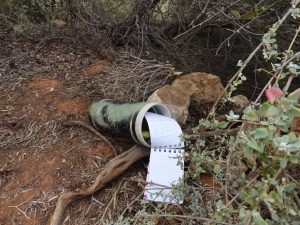
This was the beginning of a worldwide game called “Geocaching.” Friends of Dave went and did their own hides for other friends to find, and consequently many more joined in the fun. In fact, there are now 7 million people looking for more than 3 million caches hidden across the world. And over 150 of those hides are placed at significant sites of the Mary MacKillop story.
Each ‘hide’ in Geocaching has a page on the website with a story about the hide, clues (e.g. size of the container and other hints like, “in a tree”) and a map to find it. When someone finds the hide, they leave their name on the paper inside the cache and type a message on the website.
The first hide for the Mary MacKillop cache series was hidden at Mount Street, North Sydney near the site of her burial place. The hides have now extended to be in all states and territories, as well as New Zealand, Ireland and Scotland. Caches are now near Museums for Mary MacKillop, schools, Statues, Plaques, streets and parks all connected to Mary MacKillop’s story
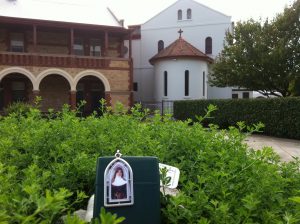
People from all over the world are discovering these hides and learning about Mary MacKillop. In many cases, they had not previously heard of her story. Unlike books, geocaching allows for a physical adventure to places of significance in Mary’s life. Posts on the website by finder’s attribute to this…
I have travelled this road to work for many years. Never knew Mary started this school in my town.
So, if you would like to know more about Mary MacKillop you could read a book, surf the web or visit one of the museums. Alternatively, download the Geocaching App on your iPhone (or visit the website), hit the ‘find a geocache’ button and follow the directions.
A great way to do a pilgrimage… no bookings required!
Happy Geocaching!
Watch a video explaining geocaching here
Julianne Murphy rsj
A Day in the Life: Irish in Australia / Ireland

The invitation to write an article on “Irish in Australia/Ireland” evoked many memories around the generic involvement of the Irish in the Congregation as well as my own personal memories. On reading the stories of Saint Mary of the Cross MacKillop I learnt that there were Irish women among her first companions. One of the earliest was Rose Cunningham who joined Mary in Penola and went with her to Adelaide. Sadly, Rose’s life took a turn for the worse in 1918. She had been working as a governess in Penola. Over time, Rose showed signs of mental illness in the budding Institute. Eventually she had a complete breakdown, was admitted to a mental asylum where she spent 48 years before her death.
Ireland: The History of Newmarket
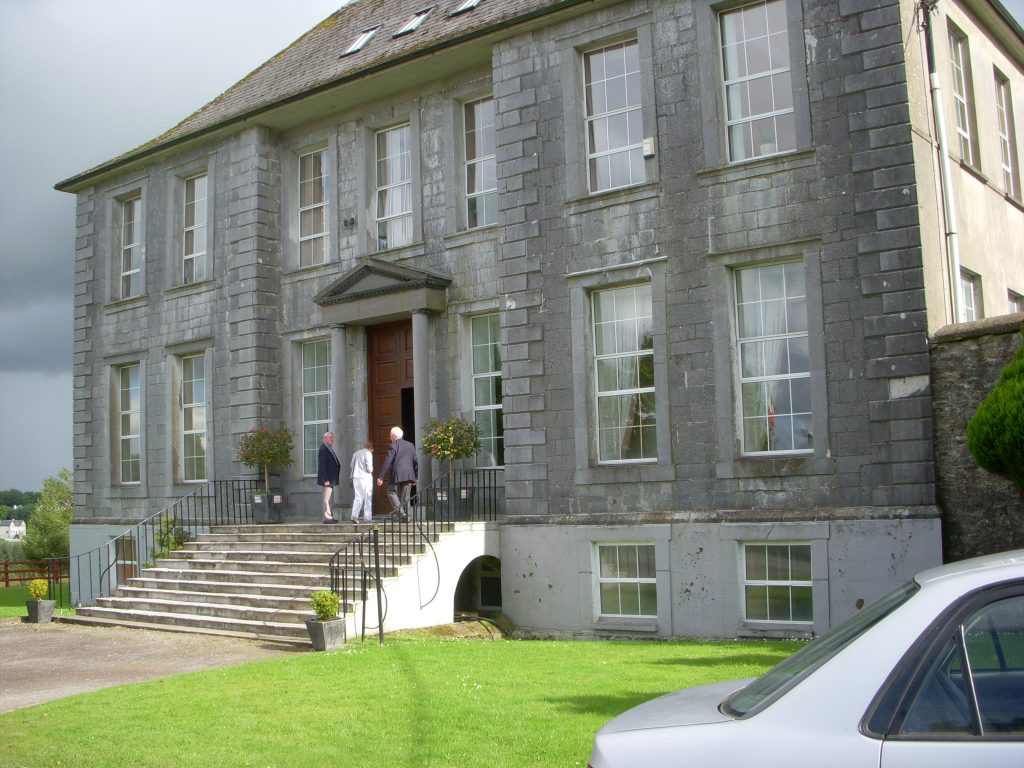
Teachings from a 295-Year-Old House on how to Survive a Pandemic.
As the coronavirus pandemic was invading our world, in came a request to write about the grand old Irish house, Newmarket Court in County Cork. Initially this felt rather strange but in researching the life of the 295-year-old house with a chequered history, some strategies for surviving in the new-normal, which is so abnormal, were revealed!
